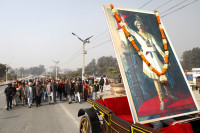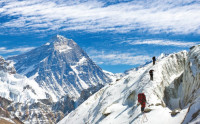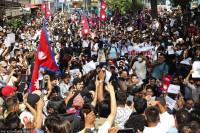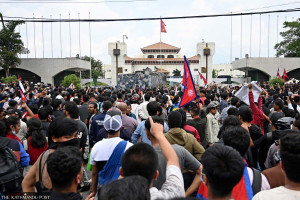Opinion
Petrol trail
Normal conceptualisations of actions and processes have temporarily ceased to work in Nepal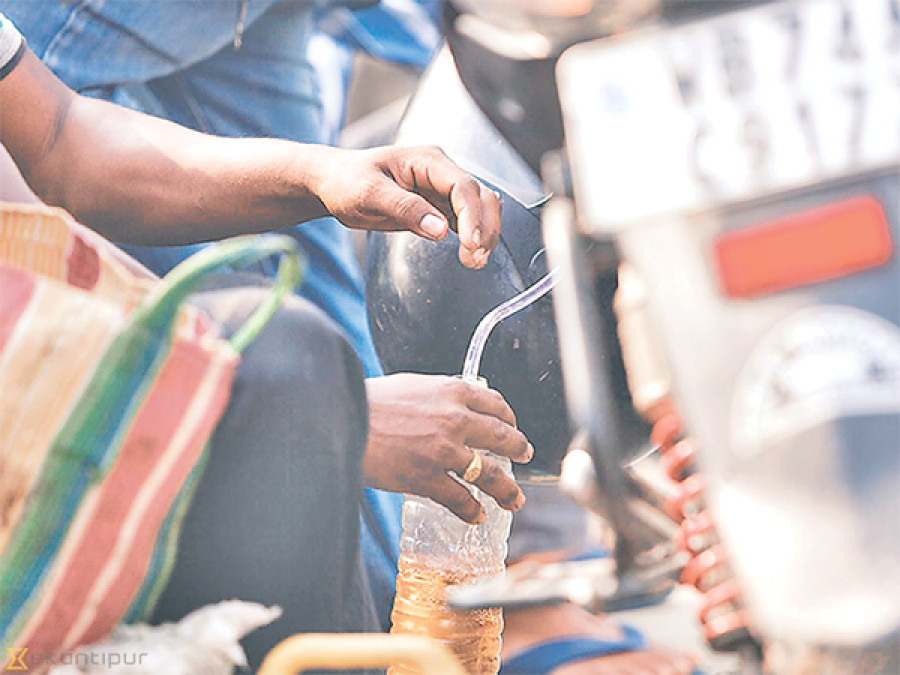
Bicram Rijal
Nepal is facing an acute shortage of petroleum products ever since India imposed a blockade in the immediate aftermath of the promulgation of Nepal’s new constitution in September. The daily lives of the people, contingent upon the availability of petroleum products, have been severely affected. It has forced many to seek available alternatives. People have started using firewood or electric stove to prepare meals. But given the frequent power cuts and limited availability of firewood, it does not look as though people’s dependency on petroleum will end anytime soon.
The Indian embargo concomitant with the agitation in the Tarai has resulted in multiple intended and unintended consequences for the country. One of them is our changed relationship with petrol. What was, until a couple months ago, only a mundane object, petrol now has become the object of desire—the most sought after product at the moment. The access to petrol even seems to have temporarily transformed people’s class status as perceived by others. For instance, about a month ago, I gave lift to a student on my scooter from Naikap to Teku. During the journey he jokingly said, “Dai, you are among the richest persons in Nepal right now.” When I asked him the reason for saying so, his short and witty answer was, “Because you have petrol.”
Power of petrol
Everything has been revolving around petrol since the blockade: national politics, Nepal’s strained relationship with India, and the ongoing and prospective business ‘deals’ with China. Further, Nepal’s ‘success’ or ‘failure’ as a state is currently very much dependent on resolving this petrol and political crisis in the Madhes. Frustratingly, it seems that as long as petrol is available in the black market and unless the everyday life of the people does not come to a complete halt, Nepal’s ruling and mainstream parties will not feel the urgency to resolve the ongoing political crisis. Because, regardless of what happens, their stoves will not stop lighting up and their scheduled plans will be least affected. Similarly, the agitating Madhesi parties will also continue to feel ‘successful’ until the entry of petrol and other commodities to Nepal are constrained or disrupted at the border. They are well aware of how petrol-dependent most of Nepal, more so Kathmandu, has become in recent years. While the news about the hundreds of fuel tankers stuck in Indian towns across the Nepal-India border has become the cause of worry and uncertainty for many Nepalis and their government, the agitating parties and the Madhesi people perhaps see this situation as their moral victory. Petrol, in this context, embodies these contrasting moral dispositions and lived experiences at once.
Cross-border flow
However, not every part of Nepal has been equally affected by the fuel shortage.
In Kakarbhitta, a border town in Jhapa district in east Nepal, for instance, petrol and other petroleum products are available in relative abundance. One can smell and see petrol at local grocery stores, on highway bridges, and on rickshaws, bicycles, motorbikes and jeeps coming from India. While standing in the middle of the Mechi River Bridge, no- man’s land, I observed a few men transferring petrol from Indian bikes to Nepali bikes with the help of a rubber pipe. After a while, four women came from Panitanki, India entered the bridge with plastic containers filled with petrol and stood close by observing the men. They were also on the lookout for prospective buyers, in most cases, Nepali motorcycle riders. A while later, a paddle-rickshaw carrying a Nepali woman and a boy stopped in front of me. The rickshaw puller pulled up the seat and took out a five-litre container filled with petrol and handed it over to a man, who was waiting for the rickshaw to arrive. The woman and I happened to look at each other and she smiled—a gesture perhaps to hint that she was innocent and not involved in the smuggling of petrol. But I could not help but ask if she knew about the petrol underneath her seat. “No,” she replied. Then I asked the man, who had just received the container from the rickshaw puller, “Who planned to cross the petrol through the border this way?
You or the rickshaw puller?” He said, “Both of us did.”
Not at all normal
After that incident, I walked further towards the Kakarbhitta border and noticed a Nepali policeman standing below the bridge with a wooden stick on a dirt road in the middle of paddy fields perhaps to block the illegal entry of petrol and other commodities into Nepali territory. At that moment, there was no one else in the vicinity. But when several women carrying multiple containers of petrol entered Kakarbhitta right in front of Nepal’s border checkpoint the next morning, there were no complaints by the police personnel. While the Indian police chase away people who try to cross the border with containers of petrol into Nepal, the Nepali border security let them enter without any obstruction. In normal times, such a border-crossing would have been deemed illegal and described as smuggling at least from the perspective of the Nepali border security. But, since these are abnormal times in Nepal, the normal conceptualisations of actions and processes have temporarily ceased to work. Hopefully, Nepal will revert back to normalcy soon and the normal conceptualisations will start to make sense again.
Rijal is a PhD candidate in Anthropology at Simon Fraser University, Canada




 6.01°C Kathmandu
6.01°C Kathmandu

